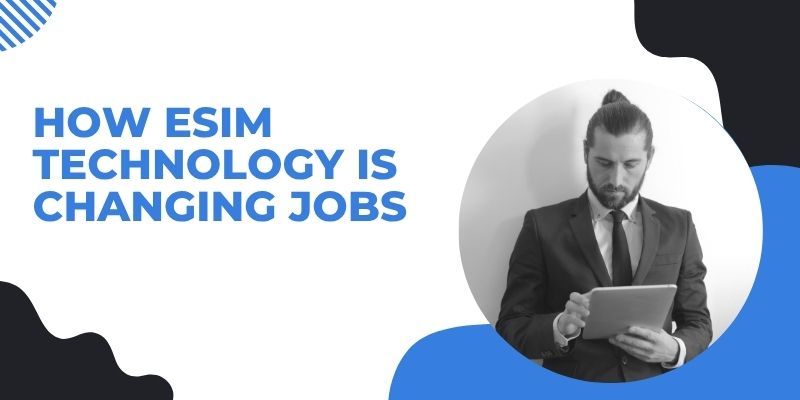Introduction: How eSIM Technology Is Changing Jobs
In today’s fast-moving world of work, technology is shaping almost everything—from how we get hired to how much we earn. And one piece of tech that’s making a big impact (quietly but powerfully) is eSIM, or embedded SIM.
If you’ve ever had to swap SIM cards in a new country or hunt down a mobile shop while traveling, you’ll understand just how valuable eSIM is. With eSIM, there’s no physical card to change. Instead, you can switch mobile networks, activate new data plans, or stay connected wherever you are—all with just a few taps on your phone.
But this isn’t just about convenience. eSIM is reshaping how we work, where we work, and even what we get paid.
Table of Contents
eSIM and the Rise of Flexible Work
Since the COVID-19 pandemic, remote work has become normal for millions of people around the world. Now, you don’t need to live in a big city or report to a corporate office to have a full-time job. You could be working from a beach in Bali, a cabin in the mountains, or a coworking café in Berlin—as long as you have internet.
That’s where eSIM comes in.
For digital nomads, freelancers, and remote employees, eSIM means no more juggling multiple SIM cards or struggling to find a local data plan in a new country. You can set up your mobile internet before even stepping on the plane.
This kind of freedom is changing the very idea of work. Employers are more open to hiring global talent. Workers are demanding better pay for their skills—not based on where they live, but on what they can do. And because staying online is critical, access to fast and affordable internet through eSIM is becoming part of the conversation around salary and working conditions.
How eSIM Helps Remote Workers Earn More
If you’re someone who works online and travels often, having eSIM can give you an edge. Here’s why:
Always Connected
You can jump on client calls, respond to emails, and send in projects from anywhere. That reliability makes you a better hire or freelancer—someone people can trust.
Tech-Savvy = Professional
Using eSIM shows that you’re ahead of the game. Employers and clients love working with people who are organized and tech-smart.
Better Pay
If you’re always available and deliver good work no matter where you are, you’re in a great position to ask for higher pay. This is especially true in jobs like software development, graphic design, customer support, or digital marketing.
In a way, eSIM is now as important to your career as your laptop or your resume.
Freelancers, Gig Workers, and Global Nomads: eSIM Is Your Best Friend
For freelancers and gig workers who take on clients from around the world, staying online is non-negotiable. Whether you’re working from your phone, tablet, or laptop, you need a data connection you can count on.
Here’s why eSIM is a game-changer in this space:
- Lower Costs: Say goodbye to expensive roaming charges. eSIM providers usually offer local rates—even if you’re not local.
- Fast Setup: You can buy a plan and get online in minutes. No waiting, no shops, no paperwork.
- Data-Only Plans: Perfect for remote work. No need to pay for calls if you’re using Zoom, Slack, or Google Meet.
- Works in Many Countries: One eSIM can cover dozens of countries. No need to switch every time you cross a border.
All this means you can take on more projects, serve more clients, and make more money without worrying about losing your connection.
Top 5 eSIM Providers for Professionals in 2025
If you’re looking for the best eSIM provider for work and travel, here are five solid choices:
eSIM Plus
A favorite among digital workers. It’s fast, reliable, and works in over 180 countries. The app is easy to use, and support is available in many languages.
Airalo
Very popular and offers a wide range of regional and country-specific plans. Pricing is fair, and setup is easy. Customer support can be a bit slow, though.
Nomad
Built with remote workers in mind. Strong coverage, especially in Europe and North America. Plans are flexible, and setup is quick.
Ubigi
Great for business travelers and tech users. Ubigi is also used in cars and IoT devices. It’s fast and reliable but may be a little technical for beginners.
GigSky
Available in more than 190 countries. It works well with phones, tablets, and even smartwatches. The app could use a design refresh, but the service is trustworthy.
The Bigger Picture: How eSIM Is Shaping the Global Workforce
As more people move toward freelancing, remote work, and digital careers, connectivity is everything. Companies don’t have to deal with expensive roaming reimbursements anymore, and workers can travel without skipping a beat.
eSIM is helping create a world where:
- Employees can live where they want
- Salaries reflect skills, not geography
- Freelancers can accept global jobs easily
- Work-life balance is actually achievable
It’s not just about internet access anymore. It’s about freedom, opportunity, and earning power.
Final Thoughts
If you’re working remotely or running your own freelance business, understanding eSIM isn’t just helpful—it’s essential. It’s one of those tools that quietly makes your work easier, your travels smoother, and your career more flexible.
And as this technology keeps growing, we’ll likely see even bigger changes in how people get hired, where they live, and how they get paid.
In 2025, staying connected isn’t just a perk—it’s the backbone of the modern career. And eSIM is making that connection easier, smarter, and more global than ever before.










